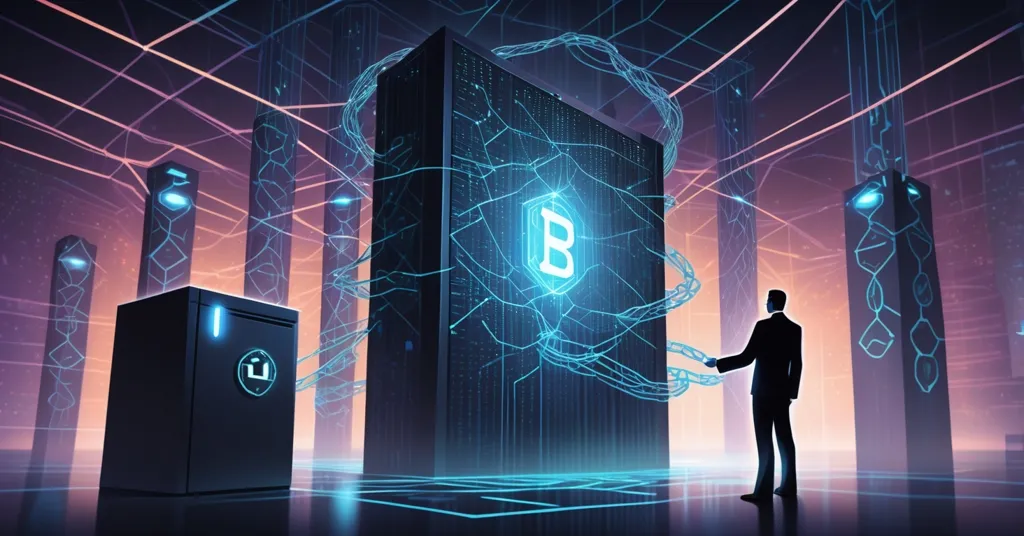Google’s MCP Server: Fighting AI Lies, Boosting Blockchain Trust?

Google’s MCP Server Battles AI Hallucinations: A Trust Ally for Blockchain?
Trust is the backbone of both cryptocurrency and cutting-edge tech, yet it’s often the hardest nut to crack. Google’s latest move with the Model Context Protocol (MCP) Server, tied to its Data Commons platform, is a direct jab at AI’s notorious habit of spewing fiction—known as “hallucinations.” But here’s the kicker for us crypto folks: this push for verifiable data could be a silent partner for blockchain’s mission of immutable truth, potentially powering decentralized systems with real-world facts. Let’s unpack this beast and see where it fits in our world of disruption and decentralization.
- Core Tech: MCP Server lets AI tap verified public data using simple, natural language queries.
- AI Fix: Targets AI hallucinations by anchoring outputs to solid datasets, not internet guesswork.
- Crypto Relevance: Could mesh with blockchain for trusted data in DeFi, DAOs, and beyond.
What Exactly is the MCP Server?
Google’s MCP Server is a new layer on top of its Data Commons platform, a project kicked off in 2018 to pool public datasets from global heavyweights like the United Nations, national governments, and local sources. We’re talking census numbers, climate records, economic stats—real, vetted information. Historically, accessing this stash required serious tech chops, wrestling with complex tools (think software bridges that let programs talk to each other). The MCP Server flips that script by allowing developers and AI systems to query this data in plain English, no PhD required. It’s like giving AI a librarian who only pulls trusted books off the shelf, skipping the tabloid trash.
Originally crafted by Anthropic as an open-source framework in November 2024, the Model Context Protocol has been snatched up by tech giants like OpenAI, Microsoft, and now Google, each integrating it to connect AI—specifically large language models (those clever systems that mimic human text)—to reliable external data. Google’s twist is embedding it directly into Data Commons, creating a dedicated server open to any developer with an AI model in their toolkit. With support from Google’s own Agent Development Kit and Gemini command-line tools, it’s a nod to accessibility, echoing the open ethos we cherish in decentralized tech.
Tackling AI’s Dirty Little Secret: Hallucinations
AI hallucinations aren’t just a techie buzzword—they’re a damn problem. Picture an AI confidently telling you the population of a city is 10 million when it’s barely 1 million, all because it slurped up some unverified blog post during training. A Cornell University study hammered home how often AI, fed on the chaotic mess of internet content, fabricates “facts” with disastrous potential—from skewed business decisions to misleading health advice. It’s a trust crisis not unlike the early days of crypto scams where fake whitepapers fooled the masses.
Google’s MCP Server steps in as a bouncer, ensuring AI leans on verified datasets instead of digital hearsay. Need climate stats for a report? Ask in plain language, and the system pulls from Data Commons’ curated pool, not some random forum. Prem Ramaswami, Head of Google Data Commons, nailed the simplicity of this approach:
The Model Context Protocol lets AI grab the right data at the right moment without needing to decode our complex systems or APIs. It’s about making the tech work for you, not the other way around.
Beyond the tech sphere, Google’s also flexing real-world impact, partnering with the ONE Campaign to build the One Data Agent tool. This focuses on health and economic data for Africa, tracking critical issues like disease outbreaks or poverty metrics with precision. It’s a noble use case, but let’s not sip the Kool-Aid just yet—there are thorns in this rosebush, as we’ll get to shortly.
Blockchain and MCP: A Trust Power Couple?
So why the hell should Bitcoiners or blockchain buffs give a toss about an AI data tool? Simple: trust is our currency, and verifiable data is the mint. While Bitcoin itself doesn’t need real-world stats to chug along—its beauty lies in pure, self-contained math—other corners of the crypto space, especially Ethereum and altcoin ecosystems, thrive on external inputs. Think decentralized finance (DeFi) platforms needing accurate price feeds for tokenized assets, or decentralized autonomous organizations (DAOs) requiring demographic data for governance decisions. MCP Server’s knack for delivering vetted information could be a game-changer here.
Imagine a DeFi protocol syncing with something like Chainlink oracles, already a bridge for real-world data to blockchain, but now supercharged by MCP’s access to census or economic figures. Smart contracts could execute loans or trades based on hard facts, not flaky web scrapes. Or picture a decentralized identity system pulling verified stats to issue credentials on-chain, bolstering trust in a world where scams are a dime a dozen. The open-source nature of MCP also vibes with the community-driven spirit of decentralization—much like Bitcoin’s code, it’s free for anyone to tweak and build upon.
Moreover, blockchain’s immutable ledger paired with MCP’s data validation paints a picture of ironclad reliability. A smart contract on Ethereum could lock in a climate stat from Data Commons via MCP, timestamped and unchangeable on-chain, for use in a tokenized green energy market. It’s not far-fetched to see this as a stepping stone for trustless systems scaling into mainstream sectors like insurance or supply chain—areas where bad data can sink millions. For us accelerationists pushing effective progress (e/acc), this kind of tech synergy is the fuel for mass adoption, fast-tracking trust in decentralized setups.
Risks and Red Flags: No Rose Without Thorns
Before we get too cozy with this tech, let’s slap on the skeptic goggles. OpenAI, one of MCP’s adopters, has already sounded alarms about security pitfalls with custom servers. Malicious integrations could sneak in harmful prompts, siphoning sensitive data or skewing AI outputs—a tactic not unlike phishing scams or oracle manipulation we’ve seen in crypto hacks. Remember the 2016 DAO exploit on Ethereum? Bad data inputs can bleed systems dry, and MCP servers, if not airtight, could be the next weak link. It’s a stark reminder that even shiny new tools need battle-hardened defenses.
Then there’s the elephant in the room: Google itself. Sure, MCP is open-source, but a centralized giant steering the ship raises eyebrows. Could access to this “public” data come with strings attached, much like centralized stablecoins often hide custodial risks? Will Google’s involvement morph into a control grab dressed as innovation, mirroring debates around centralized exchanges like Coinbase versus true peer-to-peer systems? For every step toward accessibility, there’s a potential slide into a walled garden—something Bitcoin maximalists like myself grit our teeth over, even as we acknowledge the niche roles other protocols play.
These risks aren’t just theoretical. Prompt injection attacks—akin to slipping malware into a crypto wallet—could turn a trusted data tool into a liability. And while partnerships like the ONE Campaign show goodwill, they don’t erase the fact that Big Tech’s track record on privacy and autonomy is spotty at best. We’ve got to keep our guard up, ensuring tools like MCP don’t become backdoors to centralization in disguise.
The Bigger Picture: Trust as the New Frontier
Zooming out, Google’s MCP Server sits at a fascinating crossroads of AI and trust-building, a parallel to crypto’s own war on centralized opacity. As large language models burrow deeper into sectors like healthcare, finance, and governance, the demand for accuracy isn’t a luxury—it’s a necessity. Much like Bitcoin emerged to challenge fiat’s flaws with a trustless ledger, initiatives like MCP are wrestling with AI’s credibility gap. The difference? One’s a grassroots rebellion; the other’s a top-down fix from a tech titan. Both, though, are chasing the same holy grail: systems we can bet on without second-guessing.
Looking ahead, the convergence of AI and blockchain could redefine how we handle data in a decentralized future. Projects like Fetch.ai or SingularityNET are already blending these worlds, using blockchain to secure AI-driven data markets. MCP Server, if it stays true to its open roots, might accelerate this trend, handing developers the raw materials to build trust into every layer of tech. For those of us rooting for effective accelerationism, this is the kind of momentum that could propel crypto from fringe to foundation—provided the security and centralization kinks get ironed out.
Ultimately, while Bitcoin remains the purist’s north star, tools like MCP highlight how broader tech innovations can bolster the decentralized cause. Ethereum’s smart contracts, altcoin experiments, and cross-chain bridges could all gain from verified data pipelines, filling gaps Bitcoin doesn’t aim to. The question is whether this push for reliability will stay open and community-driven, or if Big Tech’s shadow will loom larger. Trust isn’t just a tech problem—it’s the problem, and solving it could be as revolutionary as a certain whitepaper dropped in 2009. Let’s watch closely and hold everyone’s feet to the fire.
Key Questions and Takeaways
- What is Google’s MCP Server, and why does it matter?
It’s a tool for accessing verified public data through natural language queries on the Data Commons platform, crucial for making AI outputs reliable by dodging unverified content. - How does it address AI hallucinations?
By linking AI to trusted datasets like census or climate stats, it cuts down on the fabricated nonsense AI often churns out from dodgy web sources. - What’s the connection to blockchain and crypto?
Verified data via MCP could power DeFi price feeds, DAO governance, or on-chain identity systems, pairing with blockchain’s immutability for unbeatable trust. - Are there dangers to watch for with MCP Server?
Hell yes—OpenAI flags security risks like data theft through malicious server tweaks, echoing crypto’s own battles with hacks and exploits. - Who can tap into this technology?
It’s open-source, so any developer with an AI model can use it, backed by Google’s dev tools for maximum reach, much like open crypto protocols. - Could centralization be a looming issue?
Absolutely. Google’s role raises red flags about control, akin to centralized exchanges in crypto—will this stay open, or become another moat?



